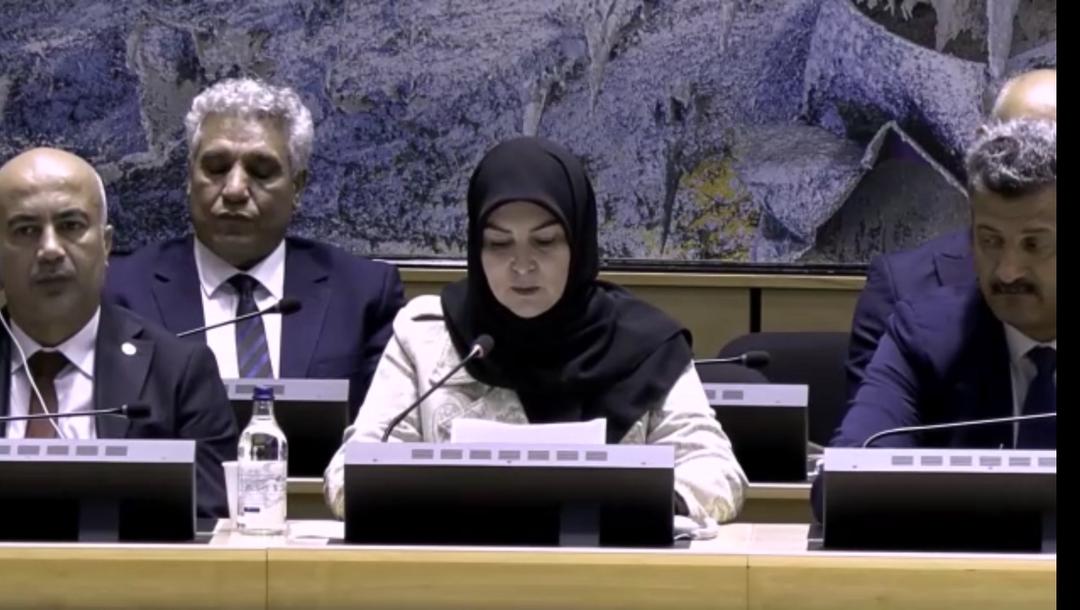The Public Prosecutor’s Office reviews the achievements of investigations and prosecutions during 4 years before the Human Rights Council in Geneva
Pulbished on:
Geneva, November 11, 2025 (LANA) - The Public Prosecutor’s Office confirmed, on Tuesday, that the Public Prosecution in Libya exercises its powers with complete independence and impartiality, and that protecting human rights and combating impunity represents a daily work policy applied on the ground.
During the review of Libya’s national report before the Human Rights Council in Geneva, the representative of the Public Prosecutor’s Office, Fatima Al-Mansouri, renewed the Public Prosecution’s commitment to international standards of justice, and to cooperating with national and international institutions to promote human dignity, establish the rule of law, and achieve justice for all.
She added that the Public Prosecution is conducting continuous inspections of correctional and rehabilitation institutions through specialized committees to ensure the legality of the detention of inmates and respect for their dignity, noting that a committee has recently been formed to inspect the main correctional and rehabilitation institution in Tripoli and the deterrence apparatus for combating organized crime, and the committee has submitted its integrated report in this regard.
Al-Mansouri indicated that the Public Prosecution is currently supervising the inventory of the numbers of inmates and their classification, explaining that during the years 2024 and 2025, 2,738 defendants were released in implementation of the amnesty decisions issued by the Supreme Judicial Council.
She added that the Public Prosecution has begun investigating cases of serious violations within correctional institutions, where one of the heads of those institutions was detained in pretrial detention and brought to trial, in practical confirmation that the Public Prosecution does not hesitate to pursue those who attack rights and freedoms, regardless of their capacity or position.
In the context of combating corruption and protecting public funds, the office confirmed that the Public Prosecution opened hundreds of cases affecting a number of senior officials, which led to their imprisonment, trial, and the issuance of severe sentences against them, which reflects the state’s seriousness in prosecuting anyone who tampers with public funds.
The office indicated that the Attorney General issued a series of decisions during the year 2025 that reflect the prosecution’s keenness on accountability and transparency, including Resolution No. (231) to form a committee to investigate complaints directed against members of some security services to document human rights violations, and Resolution No. (232) related to investigating the damage resulting from the unrest that the city of Tripoli witnessed in May 2025.
Al-Mansouri pointed out that the formed committee began its work by receiving 30 complaints, documenting 558 evidence reports, and issuing 71 arrest warrants against identified defendants, in addition to counting 461 prisoners escaping from correctional institutions and taking legal measures to arrest them.
She pointed to the formation of a special committee to investigate violations attributed to a local group known as “Al-Amo,” whose members were involved in crimes of illegal immigration, human trafficking, torture, and rape. 18 defendants were arrested and 280 migrants were freed from captivity.
The representative of the Public Prosecutor's Office revealed that the prosecution's efforts included investigating all serious human rights violations without discrimination, including crimes committed in the city of Tarhuna, which numbered 614 cases according to the latest statistics, 255 of which were disposed of and 220 cases were referred to the judiciary, while the number of those detained in its custody reached 52 defendants, in addition to issuing orders to arrest 111 other defendants.
The investigations included crimes of murder, kidnapping, enforced disappearance, and torture, and resulted in the discovery of a number of mass graves, where the prosecution began taking the necessary measures to exhume the remains and identify the victims.
The office highlighted its efforts to combat illegal immigration and human trafficking, by establishing specialized prosecutions and field monitors to follow up on these cases, noting that from 2021 to 2025 these prosecutions will investigate more than 74,812 cases related to regulating immigration, in addition to 12,414 human trafficking cases, which included criminal formations and armed groups.
He explained that the investigations resulted in the referral of a large number of defendants to trial on charges of premeditated murder, attempted murder, torture, forced confinement, and rape, and the issuance of severe sentences against them. It also led to the release of thousands of detained immigrants and the uncovering of mass graves in the areas of Kufra, Al-Shuwayrif, and Murzuq.
The representative of the Public Prosecutor’s Office pointed to the efforts to develop the digital infrastructure, noting that the launch of the digital transformation system in January 2023 constituted an important reform step, as it contributed to accelerating litigation, developing the performance of public prosecution institutions, and strengthening the principle of accountability and non-impunity.
He explained that the digital system made it possible to archive judicial files electronically for the first time in Libya, which created an accurate and comprehensive database on the progress of cases and rulings, and enabled the Judgments Implementation Unit to count the number of those sentenced in absentia, which amounted to 108,939 defendants.
He added that this step was accompanied by the implementation of practical measures to pursue wanted persons, which resulted in the arrest of a large number of them, and the voluntary compliance of 22,757 people with justice, which reflects the state’s seriousness in ending the phenomenon of impunity and consolidating the prestige of the law.
He explained that the application of the system also helped in extracting criminal cards electronically and linking them to various state agencies, which enabled the purification of electoral lists for municipal councils, after audits revealed the presence of candidates accused of committing serious felonies, which prevented them from participating in the elections.
...(LANA)...




